
Dispatches, Mexico, United States
Sheriff Joe Arpaio’s Methods Earn Him Elections, But Also Protests And A Federal Lawsuit (Part 3 of 3)
October 20, 2010 By Molly OToole
PHOENIX — Mere blocks away from the gleaming, air-conditioned conference room of the U.S. Attorney’s office in downtown Phoenix, Rob McElwain, long mustache barely visible under his straw hat, stands holding a sign reading, “Indict Arpaio NOW.”
Other hand-made signs rested against a nearby fire hydrant or at his feet, while cars drove by on the busy avenue towards the state capitol building, honking with thumbs up out the windows. Another man in a wheelchair rolled by, saying, “Keep up the good work, man.”
McElwain says he has stood on this same corner protesting Maricopa County’s Sheriff Joe Arpaio every day for two years now. And he says he is usually not alone.
“What they’re doing is using politics as a wedge to divide the community,” said McElwain, insisting that the numbers in support for the aggressive enforcement policies of Arpaio’s office or legislation like SB1070 are not representative.
Such protests outside Arpaio’s office are not new. The morning of Primary Election Day the sheriff had just returned from a weekend trip to Indiana to talk about illegal immigration, for which he tweeted, “Will my protestors travel that far?”
Neither is such a schedule: Arpaio claims he’s done at least two speeches a day for the past 17 years.
But Arpaio is a distinctly Arizona institution; he has been elected a record five times since his first four-year term in 1992.
“I think they like my programs, like that I work hard and speak out, not your typical politician,” said Arpaio, from behind his massive desk in an office where dozens of awards gleamed in the morning sun. “I get to people, and they know it.”
During his nearly two-decades as sheriff, Arpaio has also welcomed the media attention that he claims dubbed him “America’s Toughest Sheriff” for a number of controversial programs. In 1993 he established a “Tent City” for convicted inmates, where 2,000 convicted men and women live in unconditioned tents with two meals a day, with pink underwear, socks, sheets, towels and even handcuffs.
Constable Phil Hazlett, who sat in on the interview with Arpaio, seemingly as a safeguard, explained later that the Sheriff likes to bring a thermometer into the tents to show the media that temperatures reach nearly 150 degrees — though towards the roof of the tents, he added, where they sleep is really closer to 110, 120 — and that half the reason for the pervasiveness of pink is the “humiliation,” and “psychological” effect.
Arpaio’s thoughts on the attention being given to Arizona in the aftermath of SB1070 echo Pearce’s.
“First of all, everybody is talking about the new law SB1070, most of them are running on that platform,” said Arpaio. “It’s really funny when something breaks and then it mushrooms and everybody gets on the bandwagon. Every campaign keeps talking about the border now; they’ve actually discovered we have a border … but people are angry, and they want something done about it.”
Yet similarly controversial policies that have found popularity with Arizona’s voting public brought Arpaio’s office under a federal investigation for civil rights abuses, begun in 2009, in addition to a separate, ongoing federal grand jury investigation in Arizona examining allegations of corruption and mismanagement.
“Big day tomorrow,” Arpaio tweeted the day before elections Aug. 24. “Important primary elections and my lawyers will be meeting with the DOJ (Department of Justice) in Washington about civil rights investigation. Don’t forget to vote.”
Arpaio steadfastly refutes these allegations, calling the investigation a “political situation,” and insisting that Obama hadn’t been in office 60 days before he sent authorities to investigate. But after a year and a half, he claims, they’ve found nothing.
The Justice Department ultimately filed a lawsuit against Arpaio on Sept. 2 after the sheriff’s office did not comply with repeated requests for explaining procedures involving the arrest and detention of Hispanics.
According to The New York Times, the Justice Department issued a number of requests for tours and interviews, and over 51 requests for documents, but most were ignored. Officials from the Obama administration claim it is the first time in 30 years that the federal government has sued a law enforcement agency to force cooperation with an investigation regarding the Civil Rights Act of 1964.
Last year, the Department of Homeland Security revoked the authority granted Arpaio’s office by a contract with the federal government known as the 287(g) program, which allowed it Immigration and Customs Enforcement status and enabled local law enforcement to assist with applying federal immigration laws.
“I’m always going to support any law that helps,” Arpaio responded to this action and the blocking of portions of SB1070 that would’ve granted similar authority. “It’s not going to hurt our operations; we’re still going to arrest them anyways.”
Arpaio calls other solutions a “joke,” such as Obama’s promise to send 1,200 National Guard troops to the border; a number of the planned 532 started patrolling in Arizona in September.
“Do you really think that will work, with the problems we have at the border?” asked Arpaio.
“I don’t believe in a wall, until someone tells me when you hop over it with a ladder, what happens to you,” he continued. “There’s a million excuses.”
Arpaio served in the federal government for 32 years, according to his Web site, beginning his career with the U.S. Drug Enforcement Administration and working around the world, from the Middle East to South and Central America, including Mexico.
“It’s an economic problem. I would like to see the U.S. even do more to create build up the economy there — not just give them helicopters or law enforcements,” said Arpaio, commenting on the $1.6 billion Merida Initiative first implemented during the Bush administration, which the Government Accountability Office reported in May has been largely ineffective.
“Having lived there, that’s going to take many years, understand, there was a lot of poverty there, still is — people want to come here, I don’t think that’s changed,” he continued, American and Arizonan flags hanging limp above either shoulder. “Although they’ve been doing it for years, nobody cared, now it’s become a big issue with the public, and in a way sometimes you gotta blame the federal – they overlooked all of this.”
Over his left shoulder, a false wooden sign designed to look like something out of the Wild West reads, “Tent City.” At the end of the interview, Arpaio handed over an autographed poster, picturing him in front of the sign in uniform and a tough pose, with a large inmate in pink boxer shorts and socks in the background.
A slab is tacked on to the top, reading, “Vacancy.”
This article is the second in a three-part series examining the immigration debate in Arizona. See part one here and part two here.
About Molly OToole
Molly O’Toole has worked for a dozen publications, from Los Angeles Magazine and USA Today to current contributions at Newsweek International and The Associated Press. She most recently returned from three months in Mexico City, working for the AP and on her thesis about U.S.-Mexico relations. Molly earned her M.A. from New York University in the global joint master's program for journalism and International Relations. She graduated cum laude from Cornell University and is a native of San Diego, California.
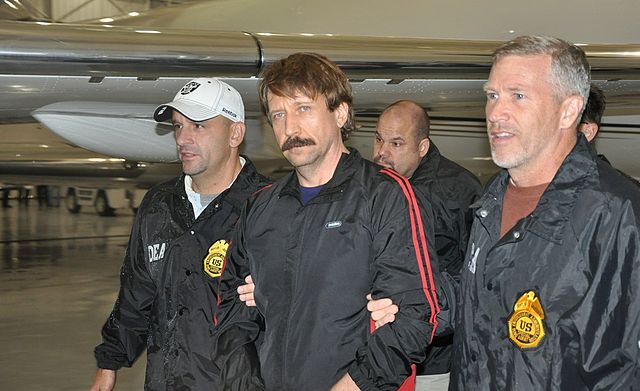

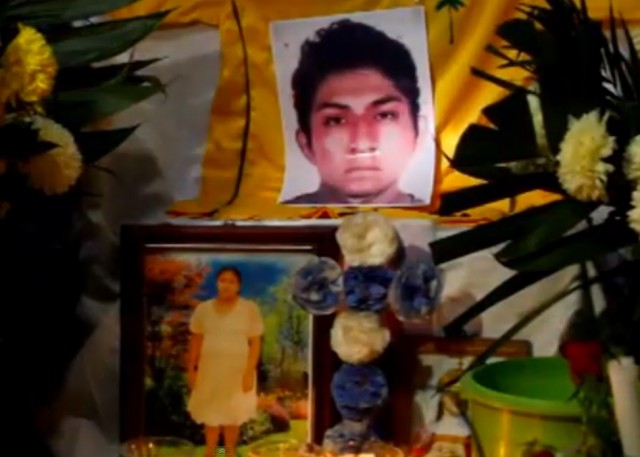
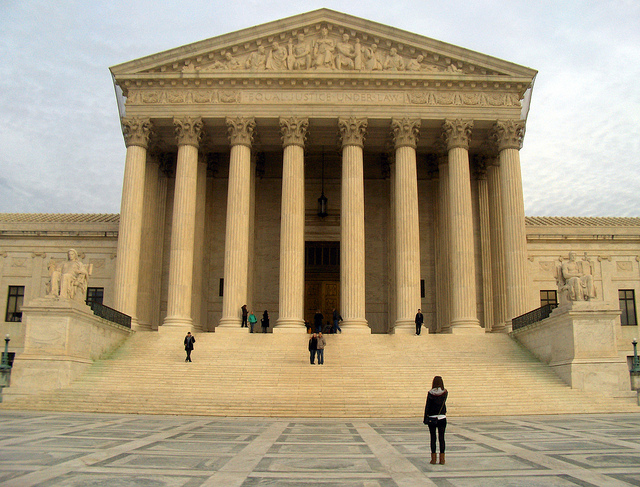
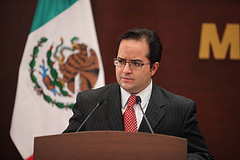
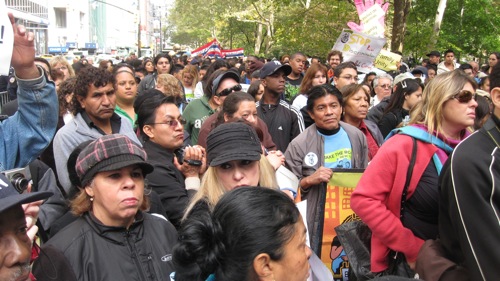
2 Comments
I hope Obama would ship a bunch of Arab Muslim into Maricopa County with refugee Visas. Joe Arpaio need a taste of Sharia Law. Tell Obama to ship Arab Muslim refugee to Maricopa County. This could be the best thing happen to Joe Arpaio.
Hi there, just browsing for information for my Joe Boxer website. Amazing the amount of information on the web. Not quite what i was looking for, but interesting page. Have a great day.
Comments are closed.